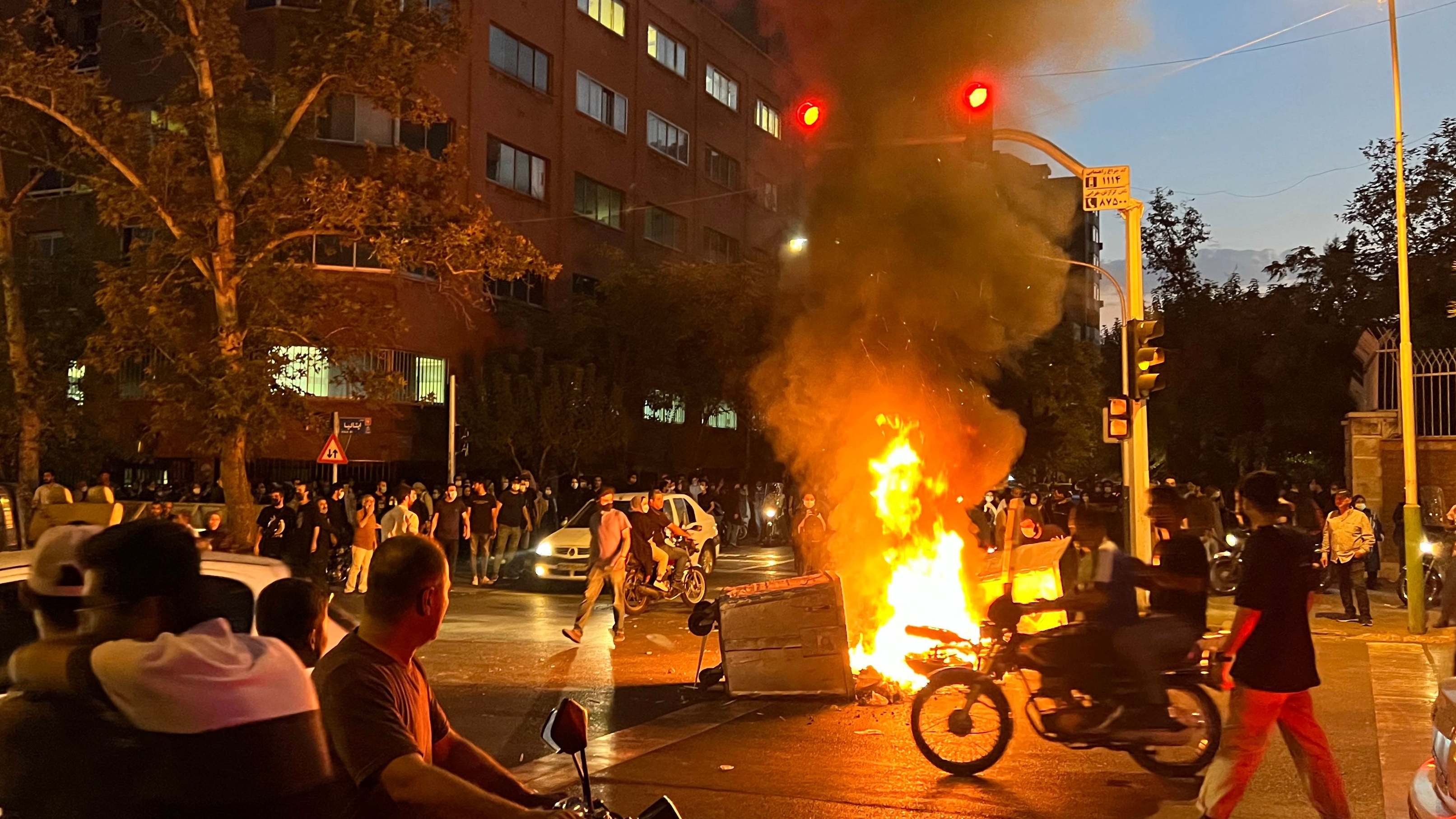How Mahsa Amini’s death sparked days of protests in Iran
Anti-government demonstrations have erupted across the country over death of young woman in police custody

A free daily email with the biggest news stories of the day – and the best features from TheWeek.com
You are now subscribed
Your newsletter sign-up was successful
The death of a young woman in police custody after she was arrested for breaking hijab laws has sparked days of violent protest in Iran.
Anger over the death of 22-year-old Mahsa Amini after she was detained by Iran’s so-called morality police has fuelled five days of unrest, with clashes between demonstrators and Iran’s security forces leaving at least eight more people dead.
The protests began in Iran’s northwestern regions but have spread to “at least 50 cities and towns nationwide”, and is the largest wave since those in 2019 over rising fuel prices, said Reuters.
The Week
Escape your echo chamber. Get the facts behind the news, plus analysis from multiple perspectives.

Sign up for The Week's Free Newsletters
From our morning news briefing to a weekly Good News Newsletter, get the best of The Week delivered directly to your inbox.
From our morning news briefing to a weekly Good News Newsletter, get the best of The Week delivered directly to your inbox.
What is happening in Iran?
Protests have been held across Iran since Saturday night when Amini’s funeral took place in her hometown of Saqez near the border with Iraq.
Since then, there has been widespread violent unrest, with the use of force to disperse crowds bringing condemnation from the international community. “Scores” of casualties have been reported, said The Times, “including a girl aged ten shot in the head”.
On Tuesday night, thousands took to the streets, with “videos of protests emerging from dozens of towns and cities”, ranging from the capital Tehran to “traditionally conservative strongholds” like Mashad, said CNN.
“Footage shows some protesters chanting, ‘Women, life, freedom’,” reported the broadcaster, while “others can be seen setting up bonfires, scuffling with police, or removing and burning their headscarves”. Other protesters are seen “destroying posters of the country’s Supreme Leader and shouting, ‘Death to the dictator’.”
A free daily email with the biggest news stories of the day – and the best features from TheWeek.com
Witnesses told CNN that many of the demonstrations that took place on Tuesday appeared to be “flash protests”, with groups forming and dispersing quickly to “avoid run-ins with Iran’s security forces”.
With the wave of protests showing little sign of abating, authorities have now restricted access to the internet. Activists have expressed concern that the shutdown “echoed a government move” before it took action against the 2019 fuel protests, when 1,500 people were killed, said Reuters.
Why are they happening?
A photo widely circulated on social media showing Amini “lying comatose in a hospital” has become “the heart of a rallying cry for Iranians who want more freedoms and rights for women”, said NPR.
Amini was a young Kurdish-Iranian woman on a visit to the capital Tehran last Tuesday when she was arrested by the morality police, a dedicated unit that enforces strict dress codes on women. The Financial Times reported that “she was accused of wearing tight trousers that contravened the republic’s obligatory Islamic dress codes for women”, which it added was confirmed by Tehran police on Monday.
The Times said that “credible reports suggest that she was beaten and sustained injuries to her head during her arrest”, which then led her to fall into a coma “from which she did not recover”.
Iranian authorities have denied she was killed while in police detention, suggesting that she suffered “sudden heart failure”, according to the BBC. But her family have said she did not suffer from any health conditions.
Her death has since sparked an “outpouring of anger” over issues “ranging from freedoms in the Islamic Republic to the crippling economic impacts of sanctions”, said CNN.
Is it a moment of reckoning for Iran?
Amini’s death is “fast becoming another moment of reckoning for the Iranian regime that fears a popular revolt more than it fears staring down the rest of the world”, said Martin Chulov, The Guardian’s Middle East correspondent.
And there are “some signs that a groundswell could be taking shape”, said Chulov, the most significant of its kind since the death of another young woman, Neda Agha Soltan, who was shot by a sniper as she attended an anti-government protest in June 2009. The “broad uprising” that took place then “nearly escaped the state’s control”.
Whether Amini’s death will “become another seminal moment in the pursuit of self-determination by so many Iranians, or an ember that eventually cools, remains to be seen”, Chulov continued. But “Iranian leaders fear a street they can no longer contain” and the “brutal death of another young woman is the recipe for more unrest”.
Amini’s death has “dealt new wounds to a deeply scarred nation”, wrote Najmeh Bozorgmehr, the Financial Times’ Tehran correspondent. “The final photograph of her, comatose in a hospital bed just days before she died, is all too resonant of a reminder of the dangers facing Iranian women.”
But the “tragedy of her death” could prove costly to the Iranian regime, which many now believe has “overstretched its enforcement of the Islamic dress code in an effort to hold back the tide of secular modernity”.
And while Iranians are aware that this week’s protests will not end the obligation for women to wear the hijab, “people are now emboldened to speak out against harsh enforcement”.
For now, authorities are being “careful”, with “hardly any senior politicians” defending Amini’s arrest. “Some conservative and hardline members of parliament even believe that apprehending women in the street should end for good,” said Bozorgmehr.